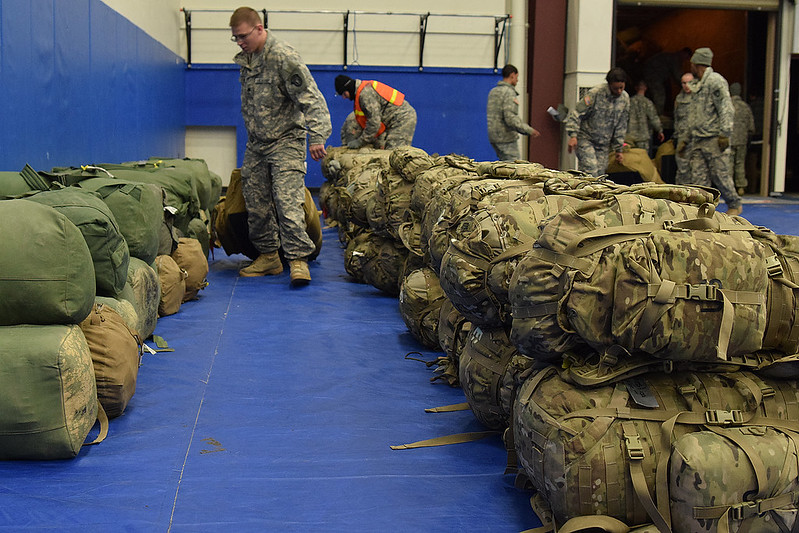Hindered by their attic’s low ceiling, she stumbled as she searched a messy heap of possessions they no longer used. She was looking for a container into which her son could pack his belongings and fly home from college for the summer. Passing packed plastic bins of out-of-season clothes and fading Christmas ornaments, she finally spotted not one but five U.S. Army empty duffel bags lined up in a far forgotten corner. Flattened out, unpacked, each thirty-six-inch-long bag was stamped on one side in large black letters, US, and when stuffed with everything a soldier would take with him for war, resembled a large green sausage. Fastened at one end with a carabiner-type latch, a padlock could be added for additional security. The opposite of civilian stylish, constructed of heavy olive drab canvas, the bags were standard Government Issue-quality, with utilitarian straps along the bag’s length that functioned like handles on a suitcase, or shoulder straps to wear backpack-style. She thought one bag had plenty of room for her son’s odd-sized objects.
“Why do we have five?” she yelled down the pull-down staircase to her retired soldier husband who stood at the stairs’ bottom. They needed downsizing, as their storage shed was bursting with un-used furniture and car parts stacked waist-high. He said, “I want them,” adding they were not to be donated or discarded. As if empty, they contained something valuable, each still fully packed and lined up alongside an Army bus, and ready to depart on orders.
Turning one bag over, she ran her hands over the coarse olive-drab cloth, and the identifying letters he’d printed with a black sharpie, of his first and last name, and those of his unit, and she recalled his oft-told deployment reminiscences.
There was the medical mission to a remote Guatemalan mountaintop people who lacked access to health care. U.S. military doctors, nurses, dentists, were tasked with making American amends for its prior violent interference in that country’s civil war by providing humanitarian care. Then there was the oft-told tales about all-night pinochle and poker games played at his base outside of Baghdad, the players ever-ready to hit the floor in the event of incoming fire. Those same bombardments had kept him from sleeping more than a few hours each night and had produced a persistent insomnia with which he still wrestled ten years later. Most frequently of all, he talked about the recuperating soldiers he’d encountered who were younger than he by thirty-plus years. Every day after lunch, he’d witnessed their wheelchairs lining up on an Army hospital porch. Each man was missing a limb or two, and sat for hours, smoking and silently staring at the facility’s impeccably manicured lawns. He couldn’t forget this image. Once he recalled it, he’d be silent for many hours.
As she earmarked one bag for their son’s packing and tossed it down the staircase, the duffel stoked like a hot coal, her own sharpest memory of being an Army wife.
When her husband emerged from an Army hospital van, along with others freshly medevacked from Iraq, he had paused. Before he embraced her in his arms, he looked her way. Then he hoisted his duffel atop his shoulders. He’d given her a moment, a moment to see his face.
For it was now graced by a single bandage, a verification for her he would no longer see in his left eye.
